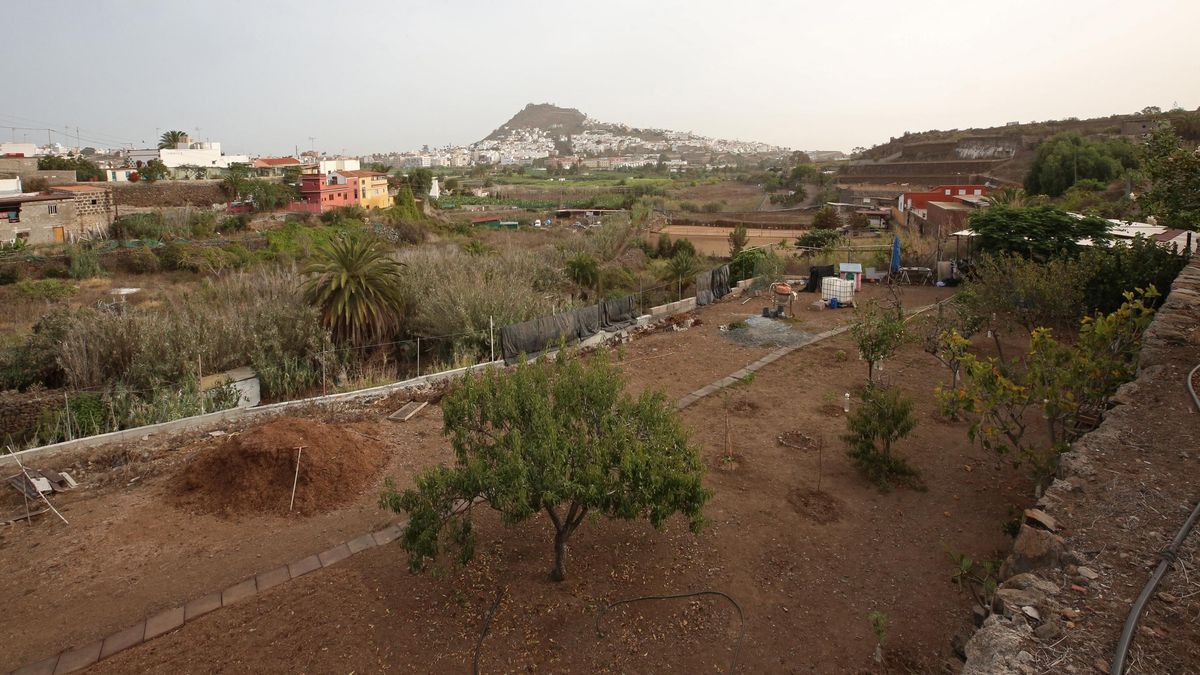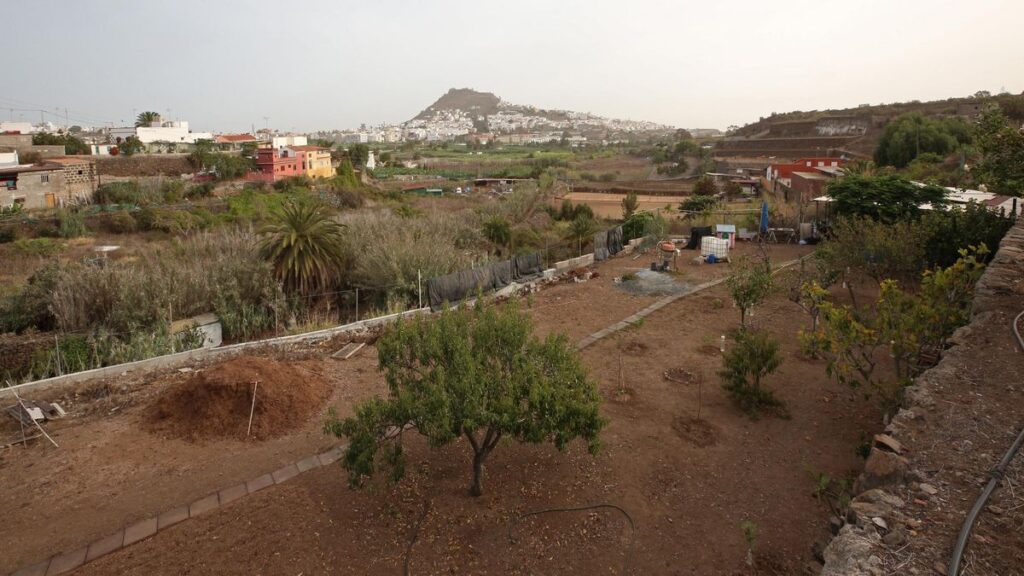A deal gone wrong
For over seven years, Carlos has been waiting for the enforcement of a final court ruling to recover the nearly €9,000 he paid as a deposit on a plot of land in Visvique, a locality in the Gran Canarian municipality of Arucas. The sale never went through due to the seller’s breach of the agreed-upon price.
A stalled legal process
Since September 2018, Carlos’s lawyer has filed 18 formal requests with the Court of First Instance and Instruction Number 2 in Arucas, demanding the effective seizure of assets belonging to the seller, V.J.C.L. The seller is a local martial arts teacher currently serving an eleven-and-a-half-year prison sentence (now on day release) for sexually abusing a nine-year-old student. The lawyer has also requested appointments with the successive judges presiding over the court on at least eight occasions, but to date, none have granted him a meeting. In all this time, Carlos has only managed to recover €210: an initial seizure of €30 four years ago, and a second one of €180 this past summer.
The broken property agreement
The conflict began in 2017. Carlos knew the landowner; for over ten years, the man had been his daughter’s taekwondo instructor at a well-known Arucas gym called Hodori. Carlos even called him “master.” They agreed on a sale price of €30,000 for the 1,400-square-meter plot of rustic land. To formalize the deal, they signed a contract with a deposit penalty clause, witnessed by two people: Carlos’s then-partner and a student from the gym. At this stage, Carlos paid €8,809 as a deposit.
However, just days later, the owner backtracked, demanding €35,000 for the property—€5,000 more than agreed. By then, a financial institution had already approved a €22,000 loan for Carlos to complete the purchase. Faced with this breach of contract, Carlos sent a formal demand letter (burofax) to the owner to recover his €8,809, but the seller refused to accept it. The case ended up in court.
A ruling condemning “malicious conduct”
Carlos filed a lawsuit, and the Court of First Instance and Instruction Number 2 of Arucas ruled in his favor. A sentence issued on March 15, 2018, ordered the landowner to return the deposit and pay interest and legal costs. The ruling described V.J.C.L.’s actions as “malicious conduct.” It highlighted his attempt to increase the initially agreed price and his “incomprehensible” refusal to handle the cash transaction with “all guarantees” before a notary, as Carlos had requested. Instead, the owner insisted on a private transaction, as revealed by WhatsApp messages submitted as evidence.
The judge also noted that the seller refused to collect the formal demand letter and even denied its existence, despite WhatsApp messages proving he knew about it. During the hearing, the defendant stated that he would return “the €8,000” to Carlos if he wanted, but immediately told Carlos’s lawyer he hadn’t done so because “Carlos himself hasn signed.” V.J.C.L. admitted he drafted the deposit contract himself—a contract that stipulated a penalty for the buyer’s breach (double the deposit) but included no penalty for the seller. The 2018 sentence states: “The defendant’s malicious conduct has created expenses for the plaintiff, directly related to the failed transaction, for which he must be compensated, such as the cost of the formal letter, notary fees, and bank charges.”
An ineffective enforcement
After the ruling became final, the enforcement process began in July of that year with a seizure order. Through a “general order,” the judge mandated the retention or freezing of V.J.C.L.’s assets (who had since sold the plot to a third party) to secure the debt repayment. However, over seven years later, the effects have been practically nil.
Carlos’s lawyer has repeatedly petitioned the court (at least 18 times in seven years) to take action so his client can recover his deposit. To date, only the two small seizures have occurred. In these petitions, the lawyer urges the court to query the judicial data network to identify properties, bank accounts, tax returns, salaries, unemployment benefits, or any other official payments in the debtor’s name, so they can be seized. The petitions are processed, but there is no response.
The lawyer understands a delay of “two or three years, at most,” depending on the court’s workload, but cannot comprehend how this case has dragged on for over seven years without his client “being able to obtain justice.” He states, “From minute one, we have requested the seizure of the commercial premises” that V.J.C.L. owns in Arucas—the gym he opened four decades ago. “We could proceed with a partial seizure of the property (the gym and attached home) and auction it, but in all this time, nothing has been done.”
Financial and emotional toll
The court’s secrecy and delays exasperate Carlos, who has faced “financial bumps” over these seven years and has been unable to repay money lent by a relative, all while knowing that nearly €9,000 (plus interest and costs) is “out on the street.”
The seller’s criminal conviction
In October 2018, just three months after the seizure order was issued, the owner of the Hodori gym was remanded in custody, accused of sexually abusing a nine-year-old student following a report by the child’s mother. The Provincial Court of Las Palmas tried the teacher and sentenced him to eleven and a half years in prison, having proven that he repeatedly abused the boy during a camping trip, at the gym, at his home, and on competition trips. The court also imposed ancillary penalties: fifteen years of staying away from the victim and a €40,000 compensation payment. The sentence included a disqualification from any profession involving “regular and direct” contact with minors for fourteen and a half years.
Appeals and a divided judiciary
In May 2021, the High Court of Justice of the Canary Islands (TSJC) upheld the conviction, though the decision was not unanimous. As has happened dozens of times in recent years, one of the judges on the penal panel, Antonio Doreste, a former president of the high court, filed a dissenting opinion arguing for acquittal. He considered the victim’s testimony insufficient and uncorroborated by peripheral elements. In his opinion, Doreste spoke of a “situation of spite” on the part of the mother, who had had sporadic relations with the teacher before the child reported the abuse. This judge also found the “massive support” for V.J.C.L. from former students and parents—including a public rally held in the municipality just one month after his arrest—to be “revealing.”
The defense used this dissent to appeal to the Supreme Court. However, the high court confirmed the conviction. In a December 2021 ruling, the Supreme Court’s penal chamber noted that until the events occurred, the child’s mother had a good relationship with the coach, even allowing her son to sleep over at his house and in his bed. “The child’s refusal to go to the appellant’s house before a tournament or championship was precisely because he complained about what happened on those occasions,” the sentence reads. The Supreme Court considered the testimonies of the mother and an aunt as corroborating elements of the child’s account, as they testified that before a trip to Tenerife for a championship, the victim began crying and refusing to sleep at his martial arts teacher’s house again. The court also emphasized that the victim’s testimony is often the only direct evidence in cases of sexual abuse, as these acts typically occur “in absolute secrecy.”
The gym remains open
V.J.C.L. has not yet served his full prison sentence but already enjoys a regime of semi-liberty (third grade), as demonstrated by his appearances on social media. The gym remains open, offering, among other activities, taekwondo classes for children. A sign at the entrance states that only cash payments are accepted.
According to commercial registry data, the convicted teacher had been the administrator since 1996 of a company dedicated to “the development of activities characteristic of gyms and schools for all types of martial arts.” In 2022, this company’s registry sheet was closed due to the revocation of its Tax Identification Number (NIF), one of the most severe measures the Tax Agency can take against companies that have long failed to meet their obligations. Attempts to ascertain whether the convicted teacher has paid the €40,000 compensation to the victim’s family have, so far, been unsuccessful.


